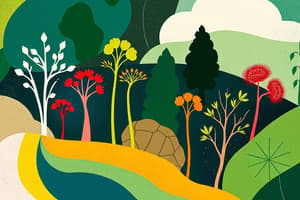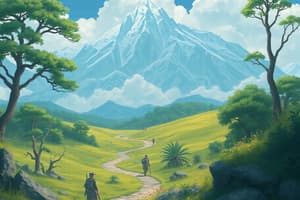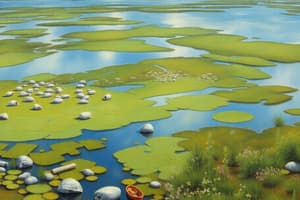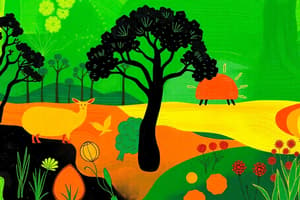Podcast
Questions and Answers
What is a savannah/tropical grassland?
What is a savannah/tropical grassland?
A tropical or subtropical grassland containing scattered trees and drought-resistant undergrowth.
What characterizes a boreal forest/Taiga?
What characterizes a boreal forest/Taiga?
Low biological diversity, long cold winters, and dominated by coniferous evergreens.
What defines a grassland?
What defines a grassland?
Regions where moderate annual average precipitation supports the growth of grass but not enough for large trees.
What are the key features of a desert?
What are the key features of a desert?
What is a deciduous forest?
What is a deciduous forest?
How is a temperate forest characterized?
How is a temperate forest characterized?
What is lichen?
What is lichen?
What does deciduous mean?
What does deciduous mean?
What is permafrost?
What is permafrost?
What does terrestrial mean?
What does terrestrial mean?
What is a habitat?
What is a habitat?
What is an ecosystem?
What is an ecosystem?
What is a niche?
What is a niche?
What characterizes the tundra biome?
What characterizes the tundra biome?
What are temperate deciduous forests known for?
What are temperate deciduous forests known for?
What defines temperate rain forests?
What defines temperate rain forests?
What are temperate grasslands characterized by?
What are temperate grasslands characterized by?
What describes a tropical rain forest?
What describes a tropical rain forest?
Flashcards are hidden until you start studying
Study Notes
Savannah/Tropical Grassland
- Tropical or subtropical grassland with scattered trees and drought-resistant undergrowth.
- Characterized by warm temperatures year-round and alternating wet and dry seasons.
- Hosts grazers like herbivores that eat grass and browsers such as giraffes that consume leaves.
Boreal Forest/Taiga
- Low biological diversity, long cold winters with short warm seasons.
- Dominated by coniferous evergreens, forming dense evergreen forests.
- Vulnerable to common fires, storms, and insect outbreaks; contains commercially valuable trees.
Grassland
- Found in regions with moderate annual precipitation (25-76 cm or 10-30 in).
- Sufficient moisture to support grass and small plants, insufficient for large trees.
- Example location: plains of the USA.
Desert
- Characterized by low moisture and unpredictable precipitation.
- Experiences wide fluctuations in daily and seasonal temperatures.
- Known as the driest biome; examples include the Sahara and areas in the United States, Mexico, and Australia.
Deciduous Forest
- Defined by warm summers and cold winters; trees (e.g. oak and maple) lose their leaves in winter.
- Supports hibernating animals like white-tailed deer, raccoons, and red foxes.
Temperate Forest
- Features cool, humid weather with abundant rainfall.
- Tree branches draped with mosses and trunks covered with lichens; forest floor layered with ferns.
Lichen
- Vegetation comprising fungus and algae, forming crustlike or branching structures on rocks and tree trunks.
Deciduous
- Trees that shed leaves during winter, enriching the soil.
Permafrost
- A permanently frozen layer of soil found beneath the ground surface.
Terrestrial
- Relating to the earth and its land-based inhabitants.
Habitat
- The specific area where an organism lives, influenced by both biotic (living) and abiotic (non-living) factors.
Ecosystem
- A community of organisms interacting with their nonliving environment within a particular area.
Niche
- The specific role or function an organism fulfills in its environment.
Tundra
- Low rainfall and permafrost characterize this biome, leading to treeless plains and low average temperatures.
- Two forms: Arctic (in high latitudes) and Alpine (in high elevations).
Temperate Deciduous Forests
- Occupy warmer climates than Taiga, primarily in North America, Eurasia, and Japan.
- Economically significant for hardwood trees, with minimal low-level vegetation.
Temperate Rain Forests
- Located in both hemispheres, these forests have temperatures remaining above freezing.
- Low diversity of plants and animals, yet significant economically; receive rainfall exceeding 250 cm annually.
Temperate Grasslands
- Found in regions too dry for forests and too moist for deserts; dominated by grasses and flowering plants.
- Includes North American prairies, Eurasian steppes, African plains, and South American pampas.
- Known for rich agricultural soil and a high diversity of large mammals; fire is a natural occurrence.
Tropical Rainforest
- Characterized by hot and wet conditions, high humidity year-round, near the equator.
- Home to Earth’s richest diversity of plant and animal species, containing two-thirds of known flowering plants.
- Abundant populations of insects and invertebrates prevalent in equatorial zones.
Studying That Suits You
Use AI to generate personalized quizzes and flashcards to suit your learning preferences.




